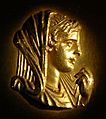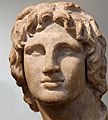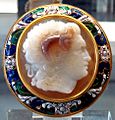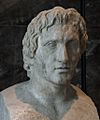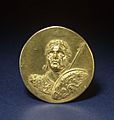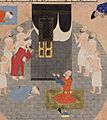Alexander the Great facts for kids
Quick facts for kids Alexander the Great |
|||||
|---|---|---|---|---|---|
| Basileus of Macedon, Hegemon of the Hellenic League, Shahanshah of Persia, Pharaoh of Egypt, Lord of Asia | |||||
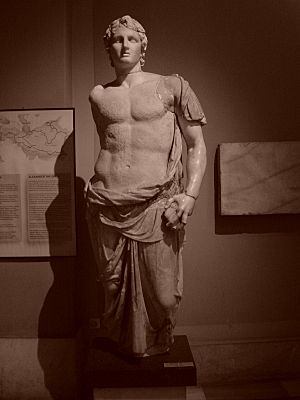
3rd century BC statue of Alexander in Istanbul Archaeology Museum
|
|||||
| King of Macedon | |||||
| Reign | 336–323 BC | ||||
| Predecessor | Philip II | ||||
| Successor | |||||
|
|||||
| Reign | 336 BC | ||||
| Predecessor | Philip II | ||||
| Pharaoh of Egypt | |||||
| Reign | 332–323 BC | ||||
| Predecessor | Darius III | ||||
| Successor |
|
||||
| King of Persia | |||||
| Reign | 330–323 BC | ||||
| Predecessor | Darius III | ||||
| Successor |
|
||||
| Lord of Asia | |||||
| Reign | 331–323 BC | ||||
| Predecessor | New office | ||||
| Successor |
|
||||
| Born | July 20 or 21, 356 BC Pella, Macedon, Ancient Greece |
||||
| Died | June 10 or 11, 323 BC (aged 32) Babylon |
||||
| Spouse | |||||
| Issue | Alexander IV | ||||
|
|||||
| Dynasty | Argead | ||||
| Father | Philip II of Macedon | ||||
| Mother | Olympias of Epirus | ||||
| Religion | Greek polytheism | ||||
Alexander III of Macedon (20/21 July 20 or 21, 356 BC – June 10 or 11, 323 BC), commonly known as Alexander the Great, was a king (basileus) of the ancient Greek kingdom of Macedon and a member of the Argead dynasty.
He was an intelligent warrior and began a strong military campaign, conquering much of Asia and northeast Africa. By the age of thirty, he had created one of the largest empires of the ancient world, stretching from Greece to northwestern India. He was undefeated in battle and is widely considered one of history's most successful military commanders.
Contents
Early life
Alexander was born in Pella in 356 BC to Philip II. He was tutored by Aristotle until age 16. After Philip's assassination in 336 BC, Alexander, at age 20, succeeded his father to the throne and inherited a strong kingdom and an experienced army.
Military campaigns
Alexander was awarded the generalship of Greece and used this authority to launch his father's project to lead the Greeks in the conquest of Persia. In 334 BC, he invaded the Achaemenid Empire (Persian Empire) and began a series of campaigns that lasted 10 years. He overthrew the Persian King Darius III and conquered the entire Achaemenid Empire. At that point, his empire stretched from the Adriatic Sea to the Beas River.
Further plans and death
Alexander tried to reach the "ends of the world and the Great Outer Sea" and invaded India in 326 BC. He eventually turned back because his troops were homesick. He had more plans to invade Arabia but was unable to complete them. He died in Babylon in 323 BC, the city that he planned to make his capital. Poison, murder, or a fever after a battle have all been suggested as his cause of death. He was only 32 years old. Alexander's body was laid in a gold anthropoid sarcophagus that was filled with honey, which was in turn placed in a gold casket.
Alexander's will called for military expansion into the southern and western Mediterranean, monumental constructions, and the intermixing of Eastern and Western populations. It included:
- Construction of a monumental tomb for his father Philip, to match the greatest of the pyramids of Egypt
- Construction of great temples in Delos, Delphi, Dodona, Dium, Amphipolis, and a monumental temple to Athena at Troy
- Conquest of Arabia and the entire Mediterranean basin
- Circumnavigation of Africa
- Development of cities and the marriages of people from Asia to those of Europe to bring unity to the continents.
Because of the diversity of the conquered lands, Alexander the Great was known by different names, if not in his time then in the stories passed down in generations since then:
- Europe - Alexander the Great
- Central Asia - Iskander
- Arab world and parts of India - Sikandar
- Parts of India - Alakshendra
In the years following his death, a series of civil wars tore his empire apart. Several states were then ruled by the Diadochi, Alexander's surviving generals and heirs. They fought and conquered each other. The largest surviving piece was the Seleucid Empire.
Legacy
Because Alexander conquered so many lands, his Greek-speaking successors brought the Greek language and culture across the eastern Mediterranean and into Mesopotamia. He founded about twenty cities that bore his name. The most familiar one is Alexandria in Egypt.
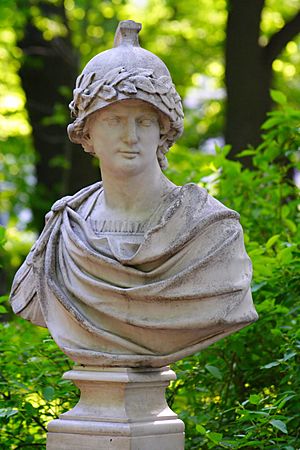
The recent discovery of an enormous tomb in northern Greece, at Amphipolis, dating from the time of Alexander the Great, looks like it may be a tomb that had been built for Alexander.
Pompey, Julius Caesar, and Augustus all visited the tomb in Alexandria, where Augustus, allegedly, accidentally knocked the nose off. Caligula was said to have taken Alexander's breastplate from the tomb for his own use. Around AD 200, Emperor Septimius Severus closed Alexander's tomb to the public.
Alexander became legendary as a classical hero, like Achilles, and he is well-known in the history and mythic traditions of both Greek and non-Greek cultures. Military leaders compared themselves to him, and military academies throughout the world still teach his tactics. He is often ranked among the most influential people in history.
Alexander the Great quotes
- "Remember upon the conduct of each depends the fate of all."
- "I am not afraid of an army of lions led by a sheep; I am afraid of an army of sheep led by a lion."
- "There is nothing impossible to him who will try."
- "Whatever possession we gain by our sword cannot be sure or lasting, but the love gained by kindness and moderation is certain and durable."
- “My treasure lies in my friends.”
Interesting facts about Alexander the Great
- His first major battle against the Persians was at the Granicus river in May 334 BC.
- He crossed the Hindu Kush into ancient India in 327 BC. It would be the bloodiest part of his campaigns.
- In India, Alexander's lung was pierced by an arrow.
- In many of his most important and decisive victories, Alexander was significantly outnumbered.
- Cleitus the Black saved Alexander's life. He cut off a Persian’s arm before the Persian could kill Alexander with his scimitar.
- Alexander’s empire stretched from Greece to Egypt in the south and into modern-day Pakistan in the east.
- Alexander wanted to unify his Greek and Persian subjects.
Images for kids
-
Archaeological Site of Pella, Greece, Alexander's birthplace
-
A Hellenistic bust of a young Alexander the Great, possibly from Ptolemaic Egypt, 2nd-1st century BC, now in the British Museum
-
Philip II of Macedon, Alexander's father
-
Battle plan from the Battle of Chaeronea
-
Alexander Cuts the Gordian Knot (1767) by Jean-Simon Berthélemy
-
Name of Alexander the Great in Egyptian hieroglyphs (written from right to left), c. 332 BC, Egypt. Louvre Museum.
-
Site of the Persian Gate in modern-day Iran; the road was built in the 1990s.
-
Administrative document from Bactria dated to the seventh year of Alexander's reign (324 BC), bearing the first known use of the "Alexandros" form of his name, Khalili Collection of Aramaic Documents
-
Porus surrenders to Alexander
-
Asia in 323 BC, the Nanda Empire and the Gangaridai of the Indian subcontinent, in relation to Alexander's Empire and neighbours
-
Alexander (left) and Hephaestion (right): Both were connected by a tight man-to-man friendship
-
Alexander at the Tomb of Cyrus the Great, by Pierre-Henri de Valenciennes (1796)
-
A Babylonian astronomical diary (c. 323–322 BC) recording the death of Alexander (British Museum, London)
-
19th-century depiction of Alexander's funeral procession, based on the description by Diodorus Siculus
-
Kingdoms of the Diadochi in 301 BC: the Ptolemaic Kingdom (dark blue), the Seleucid Empire (yellow), Kingdom of Pergamon (orange), and Kingdom of Macedon (green). Also shown are the Roman Republic (light blue), the Carthaginian Republic (purple), and the Kingdom of Epirus (red).
-
A coin of Alexander the Great struck by Balakros or his successor Menes, both former somatophylakes (bodyguards) of Alexander, when they held the position of satrap of Cilicia in the lifetime of Alexander, c. 333-327 BC. The obverse shows Heracles, ancestor of the Macedonian royal line and the reverse shows a seated Zeus Aëtophoros.
-
Alexander portrayal by Lysippos
-
A fresco depicting a hunt scene at the tomb of Philip II, Alexander's father, at the Archaeological Site of Aigai, the only known depiction of Alexander made during his lifetime, 330s BC
-
A Roman copy of an original 3rd century BC Greek bust depicting Alexander the Great, Ny Carlsberg Glyptotek, Copenhagen
-
The Hellenistic world view: world map of Eratosthenes (276–194 BC), using information from the campaigns of Alexander and his successors
-
Dedication of Alexander the Great to Athena Polias at Priene, now housed in the British Museum
-
The Buddha, in Greco-Buddhist style, 1st to 2nd century AD, Gandhara, northern Pakistan. Tokyo National Museum.
-
This medallion was produced in Imperial Rome, demonstrating the influence of Alexander's memory. Walters Art Museum, Baltimore.
See also
 In Spanish: Alejandro Magno para niños
In Spanish: Alejandro Magno para niños


